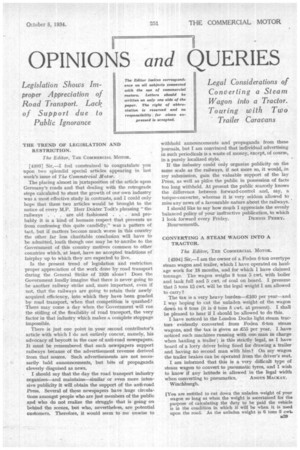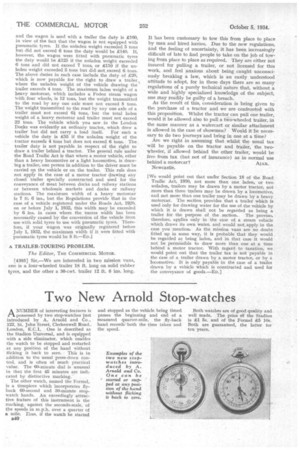OPINIONS and QUERIES
Page 57

Page 58

If you've noticed an error in this article please click here to report it so we can fix it.
Legislation Shows Improper Appreciation of Road Transport. Lack of Support due to Public Ignorance Legal Considerations of Converting a Steam Wagon into a Tractor. Touring with Two Trailer Caravans
THE TREND OF LEGISLATION AND RESTRICTION.
The Editor, THE COMMERCIAL MOTOR.
[4393] Sir,—I feel constrained to congratulate you upon two splendid special articles appearing in last week's issue of The Commercial Motor.
The placing almost in juxtaposition of the article upon Germany's roads and that dealing with the retrograde steps calculated to stunt the growth of our own industry was a most effective study in contrasts, and I could only hope that these two articles would be brought to the notice of every M.P. Herr Dokter Todt's phrasing "the railways . . . are old fashioned . . . and probably it is a kind of humane respect that prevents us from confessing this quite candidly," was a pattern of tact, but if matters become much worse in this country the other far less charitable conclusion will have to be admitted, loath though one may be to ascribe to the Government of this country motives common to other countries which, at least, have no accepted traditions of fairplay up to which they are expected to live.
Is the present trend of legislation and restriction proper appreciation of the work done by road transport during the General Strike of 1926 alone? Does the Government fondly imagine that there is never going to be another railway strike and, more important, even if not, that the railways are going to retain their newly acquired efficiency, into which they have been goaded by. road transport, when that competition is quashed? There may come a day when the Government will rue the stiffing of the flexibility of road transport, the very factor in that industry which makes a complete stoppage impossible.
There is just one point in your second contributor's article with which I do not entirely concur, namely, his advocacy of boycott in the case of anti-road newspapers. It must be remembered that such newspapers support railways because of the advertisement revenue derived from that source. Such advertisements are not necessarily bald announcements, but bits of propaganda cleverly disguised as news.
I should say that the day the road transport industry organizes—and maintains—similar or even more intensive publicity it will obtain the support of the anti-road Press. Several of these newspapers have huge circulations amongst people who are just members of the public and who do not realize the struggle that is going on behind the scenes, but who, nevertheless, are potential customers. Therefore, it would seem to me unwise to
withhold announcements and propaganda from these journals, but I am convinced that individual advertising in such periodicals is a waste of money, except, of course, in a purely localized style.
If the industry could only organize publicity on the same scale as the railways, if not more so, it would, in my submission, gain the valuable support of the lay Press, as well as pla7:ce the public in possession of facts too long withheld. At present the public scarcely knows the difference between forward-control and, say, a torque-converter, whereas it is very seldom allowed to miss any news of a favourable nature about the railways.
I should like to say how much I appreciate the evenly balanced policy of your instructive publication, to which
I look forward every Friday. DENNIS PERRY. Bournemouth.
CONVERTING A STEAM WAGON INTO A TRACTOR.
The Editor, THE COMMERCIAL MOTOR.
[4394] Sir,—I am the owner of a Foden 6-ton overtype steam wagon and trailer, which I have operated on haulage work for 18 months, and for which I have claimed tonnage. The wagon weighs 8 tons 5 cwt. with boiler and tank full and 5 cwt. of coal on board. I presume that 5 tons 15 cwt. will be the legal weight I am allowed to carry?
The tax is a very heavy burden—R.160 per year—and
was hoping to cut the unladen weight of the wagon down to 6 tons (it is 6 tons 5 cwt. at present). I shall be pleased to hear if I should be allowed to do this.
I have noticed in the London Docks light steam tractors evidently converted from Foden 6-ton steam wagons, and the tax is given as £55 per year. I have noticed such machines running with one man in charge when hauling a trailer ; is this strictly legal, as I have heard of a lorry driver being fined for drawing a trailer and having no second man with him? On my wagon the trailer brakes can be operated from the driver's seat.
I am informed that this is a very difficult type of steam wagon to convert to pneumatic tyres, and I wish to know if any latitude is allowed in the legal width
when converting to pneumatics. ANGUS MACKAY.
windaburgh.
[You are entitled to cut down the unladen weight of your wagon so long as when the weight is ascertained for the purpose of calculating the duty to be paid the vehicle is in the condition in which it will be when it is used upon the roadAs the unladen weight is 6 tons 5 cwt. and the wagon is used with a trailer the duty is £160, in view of the fact that the wagon is not equipped with pneumatic tyres. If the unladen weight exceeded 5 tons but did not exceed 6 tons the duty would be £140. If, however, the wagon were fitted with pneumatic tyres the duty would be £125 if the unladen weight exceeded 6 tons and did not exceed 7 tons, or £110 if the unladen weight exceeded 5 tons but did ,not.exceed 6 tons. The above duties in each case include the duty of £20, which is now payable for the right to draw a trailer s where the unladen weight of the vehicle drawing the trailer exceeds 4 tons. The maximum laden weight of a heavy motorcar, which includes a Foclen steam wagon with four wheels, is 12 tons, but the weight transmitted to the road by any one axle must not exceed 8 tons. The weight transmitted to the road by any one axle of a trailer must not exceed 6 tons, but the total laden weight of a heavy motorcar and trailer must not exceed 22 tons. The vehicle which you saw in the London Docks was evidently an ordinary tractor, which drew a trailer but did not carry a load itself. For such a vehicle the duty is £55 if the unladen weight of the tractor exceeds 4 tons but does not exceed 6 tons. The trailer duty is not payable in respect of the right to draw a trailer behind a tractor. The general rule under the Road Traffic Act is that where a motor vehicle, other than a heavy locomotive or a light locomotive, is drawing a trailer, one person in addition to the driver must be carried on the vehicle or on the trailer. This rule does not apply in the case of a motor tractor drawing any closed trailer specially constructed and used for the conveyance of meat between docks and railway stations or between wholesale markets and docks or railway stations. The maximum width of a heavy motorcar is 7 ft; 6 ins., but the Regulations provide that in the case of a vehicle registered under the Roads Act, 1920, on or before July 1, 1932, this width may be exceeded by 6 ins, in cases where the excess width has been necessarily caused by the conversion of the vehicle from use with solid tyres to use with pneumatic tyres. Therefore, if your wagon was originally registered before July 1, 1932, the maximum width if it were fitted with pneumatic tyres would be 8 ft.—RDA
A TRAILER-TOURING PROBLEM.
The Editor, THE COMMERCIAL MOTOR.
r4395] Sir,—We are interested in two mission vans, one is a four-wheeled trailer 18 ft. long on solid rubber tyres, and the other a 30-cwt. trailer 12 ft. 6 ins. long.
It has been customary to tow this from place to place by men and hired lorries. Due to the new regulations, and the feeling of uncertainty, it has been increasingly difficult of late to find people to take on the job of towing from place to place as required. They are either not insured for pulling a trailer, or not licensed for this work, and feel Anxious about being caught unconsciously breaking a law, which is an easily understood attitude to adopt, for in these days there are so many regulations of a purely technical nature that, without a wide and highly specialized knowledge of the subject, one may readily be guilty of a breach.
As the result of this, consideration is being given to the purchase of a tractor and we are confronted with this proposition. Whilst the tractor can pull one trailer, would it be allowed also to pull a two-wheeled trailer, in the same manner as a watercart or similar attachment is allowed in the case of showmen? Would it be necessary to do two journeys And bring in one at a time?
Are we right in assuming that whilst the usual tax will be payable on the tractor and trailer, the twowheeler, if allowed behind the other trailer, would be free from tax (but not of insurance) as in normal use behind a motorcar? AJAX. Newcastle.
[We would point out that umter Section 18 of the Road Traffic Act, 1930, not more than one laden, or two unladen, trailers may be drawn by a motor tractor, not more than three tTailers may be drawn by a locomotive, and not more than one trailer may be drawn by a heavy motorcar. The section provides that a trailer which is used only for drawing water for the use of.the vehicle by which it is drawn shall not be regarded as being a trailer for .the purpose of the section.. The proviso, therefore, applies only in the case of a steam vehicle which draws its own water, and would not apply in the case you mention. As the mission vans are no doubt fitted up in some way, it is probable that they would be regarded as being laden, and in that case it would not be permissible to draw more than one at a time behind a motor tractor. With regard to taxation, we would point out that the trailer tax is not payable in the case of a trailer drawn by ,a motor tractor, or by a locomotive. It is only payable in the case of a trailer drawn by a vehicle which is constructed and used for the conveyance of goods.—ED.]




































































































